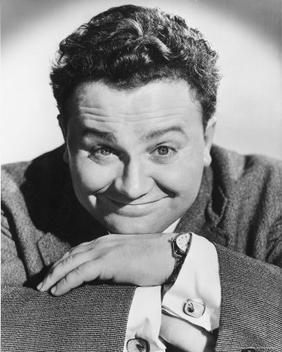
Sir Harry Donald Secombe was a Welsh actor, comedian, singer and television presenter. Secombe was a member of the British radio comedy programme The Goon Show (1951–1960), playing many characters, most notably Neddie Seagoon. An accomplished tenor, he also appeared in musicals and films – notably as Mr Bumble in Oliver! (1968) – and, in his later years, was a presenter of television shows incorporating hymns and other devotional songs.

Peter Sellers was an English actor and comedian. He first came to prominence performing in the BBC Radio comedy series The Goon Show. Sellers featured on a number of hit comic songs, and became known to a worldwide audience through his many film roles, among them Chief Inspector Clouseau in The Pink Panther series.
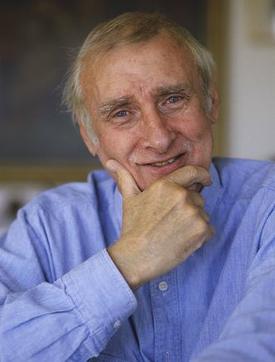
Terence Alan "Spike" Milligan was an Irish comedian, writer, musician, poet, playwright and actor. The son of an English mother and Irish father, he was born in British Colonial India, where he spent his childhood before relocating in 1931 to England, where he lived and worked for the majority of his life. Disliking his first name, he began to call himself "Spike" after hearing the band Spike Jones and his City Slickers on Radio Luxembourg.

The Goon Show is a British radio comedy programme, originally produced and broadcast by the BBC Home Service from 1951 to 1960, with occasional repeats on the BBC Light Programme. The first series, broadcast from 28 May to 20 September 1951, was titled Crazy People; subsequent series had the title The Goon Show.
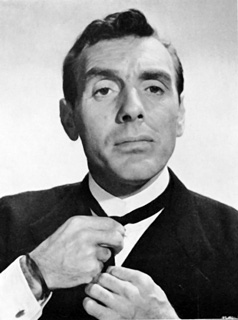
Eric Sykes was an English radio, stage, television and film writer, comedian, actor and director whose performing career spanned more than 50 years. He frequently wrote for and performed with many other leading comedy performers and writers of the period, including Tony Hancock, Spike Milligan, Tommy Cooper, Peter Sellers, John Antrobus and Johnny Speight. Sykes first came to prominence through his many radio credits as a writer and actor in the 1950s, most notably through his collaboration on The Goon Show scripts. He became a TV star in his own right in the early 1960s when he appeared with Hattie Jacques in several popular BBC comedy television series.

Graham William Stark was an English comedian, actor, writer and director.
Michael Deeley is an Academy Award-winning British film producer known for motion pictures such as The Italian Job (1969), The Deer Hunter (1978), and Blade Runner (1982). He is also a founding member and Honorary President of British Screen Forum.
Joseph McGrath is a Scottish film and television director and screenwriter. He was born in Glasgow and studied at Glasgow School of Art in the late 1940s and early 1950s where his energy and talent was admired by his contemporaries.
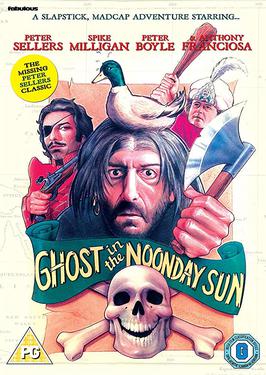
Ghost in the Noonday Sun is a 1974 British comedy film directed by Peter Medak starring Peter Sellers, Anthony Franciosa and Spike Milligan. The film suffered a difficult production due to Sellers's erratic behavior and was not theatrically released. Medak described the film as "the biggest disaster of my life" in 2016.
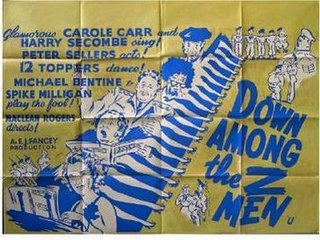
Down Among the Z Men is a 1952 black-and-white British comedy film directed by Maclean Rogers and starring the Goons: Spike Milligan, Peter Sellers, Michael Bentine and Harry Secombe.

Penny Points to Paradise is a 1951 comedy feature film directed by Tony Young and starring Spike Milligan, Harry Secombe and Peter Sellers of The Goon Show in their feature film debut.
"The Fear of Wages" is an episode of the British radio comedy The Goon Show, written by Spike Milligan and Larry Stephens. As the 25th episode of the sixth series, it was first broadcast on 6 March 1956 and was among the shows first repeated in the 1970s following the success of The Last Goon Show of All in 1972.

The Last Goon Show of All is a special edition of the BBC Radio comedy programme The Goon Show commissioned as part of the celebrations of the 50th anniversary of the BBC. Simulcast on radio and television on 5 October 1972, the performance reunited Spike Milligan, Peter Sellers and Harry Secombe as well as other contributors to the programme's original run. It was later released as a long-playing record and on compact disc. The video recording of the television broadcast was also released on VHS and later on DVD, although with some omissions. In early October 2007, 35 years after the original broadcast, a full unedited version was broadcast on BBC 7, the digital radio channel dedicated to re-runs of classic shows.

Adelphi Films Limited was a British film production company. With its sister company Advance, it produced over 30 films in the 1940s and 1950s and distributed many more. Adelphi linked Gainsborough Pictures and the raw “kitchen sink” dramas of the early 1960s.

The British actor and comedian Peter Sellers (1925–1980) performed in many genres of light entertainment, including film, radio and theatre. He appeared in the BBC Radio comedy series The Goon Show, recorded a number of hit comic songs and became known internationally through his many film characterisations, among them Chief Inspector Clouseau in The Pink Panther film series. The filmmakers John and Roy Boulting described him as "the greatest comic genius [Britain] has produced since Charles Chaplin".

James Douglas Grafton was a producer, writer and theatrical agent. He served in World War II as an officer in the Bedfordshire and Hertfordshire Regiment and was awarded the Military Cross for his actions during Operation Market Garden.

Patrick "Pat" Kenneth Macneile Dixon was an English radio producer for BBC Radio.

Lawrence Geoffrey Stephens was a BBC radio scriptwriter, best remembered for co-writing The Goon Show with Spike Milligan. Stephens was a regular writer of the show for the first two years, and then returned to The Goon Show to assist Milligan. From his association with Milligan, Stephens became involved with Associated London Scripts (ALS), and was said to have been "one of the most eye-catching characters, in the earliest days of the company...he played a significant cameo role in the first phase of success for ALS".

Bridge on the River Wye is an album by members of the British comedy group The Goon Show and other humorists. It was produced by George Martin for EMI's Parlophone Records. It is a parody of the 1957 film The Bridge on the River Kwai. For legal reasons, the 'K' at the start of Kwai was edited out.















